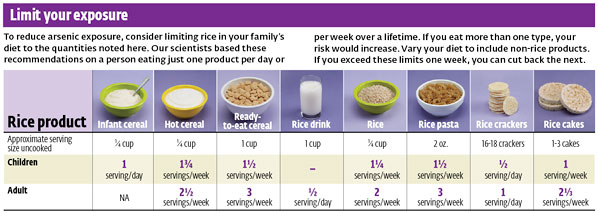Wait, now rice is bad for you, too?
Eating rice once a day can increase arsenic levels in the body by up to 44 percent , according to new research from Consumer Reports. Consumer Reports recently tested 200 samples of different rice products – from organic rice baby cereal and brown rice to rice crispies- and found alarmingly high levels of arsenic present. This has raised concern as inorganic arsenic is know to cause lung, skin and bladder cancers, as well as a host of other lifelong health problems.
The U.S. Food and Drug Administration (FDA) also released preliminary data about the arsenic levels found in 200 rice products they recently tested, which yielded similar results. But the agency will not be making any recommendations about altering the consumption of rice or rice products until they have tested an additional 1,000 rice samples, which will reportedly be completed by year end. They will likely make recommendations about consumption late next year.
So, Consumer Reports has made a number of suggestions to help people more informed food choices, like reducing infants’ servings of rice cereal to once a day and adult consumption of rice to two standard servings per week. The organization is also calling on the FDA to set limits for arsenic in food, which currently exist for water but not food.
The following infographic visualizes how arsenic gets in rice and outlines some suggestions for what you can do to limit your intake. You can find the full report here. The chart directly below the infographic lists the rice and rice products tested and the levels of arsenic found.




![[Infographic of the Week] How to Create 189k Jobs & Increase Healthy Food Sales by $9.5B](https://foodtechconnect.com/wp-content/uploads/2012/05/plant-the-plate-infographic-full1-200x200.jpg)



